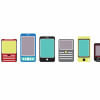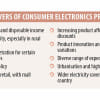Consumer electronics sales plunge amid high inflation

The consumer electronics sector in Bangladesh is witnessing a slide in demand as sales have declined by 40 per cent from a year ago amid belt-tightening by customers.
Retailers say consumers are reluctant to spend on luxury items amid the ongoing economic crisis and inflationary pains.
Although industry data on the sales of electronic home appliances is hard to come by, the sales records of companies, both foreign and local, pointed to the slump in demand.
Major players in the domestic consumer electronics market are Walton, Transcom Digital, Rangs Electronics, Rangs Toshiba, Best Electronics, MyOne Electronics Industries, Jamuna Electronics, Pran RFL (Vision), Esquire Electronics, Electra International, and Super Star Group.
Foreign companies such as Samsung, LG, General, Sharp, and Whirlpool are also popular among local consumers.
"The sales of electronic home appliances have declined by 30 to 40 per cent due to higher inflation and a spike in the price of electronic products," said Ritesh Ranjan, head of business at Transcom Digital.
The electronics home appliances market faced a slump in sales at the early stage of the coronavirus pandemic. But Ranjan said the situation is different this time.
"The price of electronic items has risen by 15 to 20 per cent because of the dollar price hike. Besides, consumers are reluctant to purchase non-essential items," he said.
The taka has lost its value by about 25 per cent against the US dollar in the past one year, led by the shortage of the American greenback.
The ongoing inflationary pressure has also impacted the consumer electronics market, Ranjan said.
Owing to escalated prices of imported commodities and raw materials, inflation has stayed at an elevated level in Bangladesh for nearly one year.
Ranjan said the sector did well in 2022 despite a number of crises. "But the ongoing economic situation is not favourable for the market."
According to the senior executive, the demand for microwave ovens and rice cookers has not fallen that much. On the other hand, refrigerators and air conditioners are facing a decline in demand.
He hopes the sales of air conditioners will increase this month as temperatures might start to rise as summers approach.
Md Manzurul Karim, general manager of Esquire Electronics, the sole distributor of Japanese electronic brands General and Sharp, said the sales of consumer electronics items have gone down by around 50 per cent as most people can't afford luxury items.
"Corporate clients have kept the business alive."
Esquire Electronics has 80 outlets and more than 400 distributors across the country. "Of them, 30 to 40 per cent are operating below break-even," said Karim.
Local manufacturers who dominate the market from urban to rural areas are facing the same situation as households don't have much disposable income.
Sales in the weeks to Ramadan usually pick up as retailers offer discounts. But the number of customers is very low this year, according to Karim.
Walton Hi-Tech Industries PLC, the country's largest consumer electronics manufacturer, recorded a massive slump in profit in 2022 although sales volume remained almost unchanged.
The company blamed the Russia-Ukraine war, higher inflation, and the price hike of the US for the drop in earnings.
"Our sales volume has remained the same despite the price spike of products thanks to the rise in raw material costs, shipping charges, and the depreciation of the taka," said Humayun Kabir, deputy managing director for marketing of Walton.
Singer Bangladesh registered its lowest profit in 14 years in 2022, owing to the increased cost of raw materials, higher freight rates, and the fall of the value of the taka.
The sales have remained the same as it was in the second half of 2022, said Kazi Ashiqur Rahman, company secretary of Singer Bangladesh.
"The market situation is not favourable for the electronic industry as electronic home appliances are not essential items like medicines and foods."
Electronic items retailers are facing a sales slump globally.
For example, US electronics retailer Best Buy has forecast a 13 per cent slump in current-quarter comparable sales, while retailer Walmart has slashed its profit forecast, saying soaring gas and food prices dented demand for discretionary items.
Both Singer's Rahman and Transcom Digital's Ranjan don't see any significant improvement to the market scenario until the war comes to an end and the economic uncertainty disappears.
Manzurul Karim said: "Our assessment showed that the market will remain dull in 2023. For this reason, we have taken steps and reduced the import of products to survive during the crisis period."

 For all latest news, follow The Daily Star's Google News channel.
For all latest news, follow The Daily Star's Google News channel. 








Comments